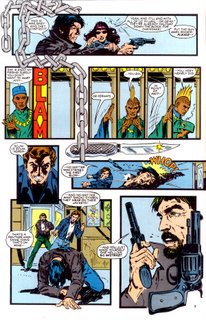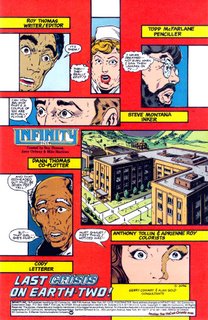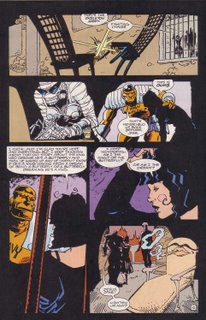Been a While, eh?
Yeah, so I kind of disappeared for a while.
No, I still haven't finished Cerebus.
Yes, it kind of sapped my energy for getting excited about comics as a medium.
Yes, I needed some really enjoyable superhero-themed comics to get my energy up.
So, I read all of the Gail Simone run on Birds of Prey, which was pretty much just what the doctor ordered. I actually kind of like Black Canary, which is a pretty significant change from the vast apathy I've felt since childhood. Huntress actually seems like a real person instead of a borderline-offensive stereotype. Very nice stuff.
That said, while the character work in the series is fantastic, the whole run feels a little thin on ideas. I mean, it's nearly 4 years of comics and introduces, what, five new characters that seem reusable? I clearly like Savant a lot less than Simone does (based on this) - he and Creote both feel like refugees from 90's comics I've only skimmed. Really, the only new addition I like is Josh, who is perhaps somewhat limited, but useful in the kind of action-comedy scenes Simone seems to like.
I'm probably coming across as more negative than I intend. Like I say, I enjoy the series, and I think it's going to be a decent enough home for Kate Spencer (though I'll feel better if her supporting cast shows up sooner rather than later). I just feel like some of the less tangible concepts aren't handled as well as they could be. The Brainiac virus storyline, for instance, would have just been awesome in the hands of someone like, say, Warren Ellis, but ended up just feeling kind of muddled here. Still, lots of well-written characters, so I can't complain.
Speaking of Ellis, am I the only person reading New Universal? More importantly, am I the only person who really loves New Universal? I'm sure there's probably a lot of scorn towards the New Universe titles, and rightly so (as anyone who read Kickers, Inc. - or, really, any of the New Universe titles other than DP7 - would probably agree), but Ellis is doing a really nice job with the "superhero-y tropes invade real world" concept. This last issue had two totally great conceptual moments that really got me (the discussion of the past appearances of superhumans and the depiction of the shining ancient city) and it's certainly my favorite series in which absolutely nothing is happening.
No, I still haven't finished Cerebus.
Yes, it kind of sapped my energy for getting excited about comics as a medium.
Yes, I needed some really enjoyable superhero-themed comics to get my energy up.
So, I read all of the Gail Simone run on Birds of Prey, which was pretty much just what the doctor ordered. I actually kind of like Black Canary, which is a pretty significant change from the vast apathy I've felt since childhood. Huntress actually seems like a real person instead of a borderline-offensive stereotype. Very nice stuff.
That said, while the character work in the series is fantastic, the whole run feels a little thin on ideas. I mean, it's nearly 4 years of comics and introduces, what, five new characters that seem reusable? I clearly like Savant a lot less than Simone does (based on this) - he and Creote both feel like refugees from 90's comics I've only skimmed. Really, the only new addition I like is Josh, who is perhaps somewhat limited, but useful in the kind of action-comedy scenes Simone seems to like.
I'm probably coming across as more negative than I intend. Like I say, I enjoy the series, and I think it's going to be a decent enough home for Kate Spencer (though I'll feel better if her supporting cast shows up sooner rather than later). I just feel like some of the less tangible concepts aren't handled as well as they could be. The Brainiac virus storyline, for instance, would have just been awesome in the hands of someone like, say, Warren Ellis, but ended up just feeling kind of muddled here. Still, lots of well-written characters, so I can't complain.
Speaking of Ellis, am I the only person reading New Universal? More importantly, am I the only person who really loves New Universal? I'm sure there's probably a lot of scorn towards the New Universe titles, and rightly so (as anyone who read Kickers, Inc. - or, really, any of the New Universe titles other than DP7 - would probably agree), but Ellis is doing a really nice job with the "superhero-y tropes invade real world" concept. This last issue had two totally great conceptual moments that really got me (the discussion of the past appearances of superhumans and the depiction of the shining ancient city) and it's certainly my favorite series in which absolutely nothing is happening.








